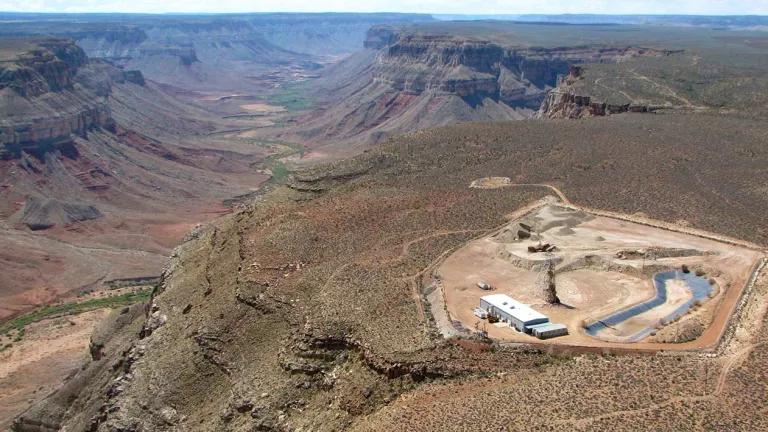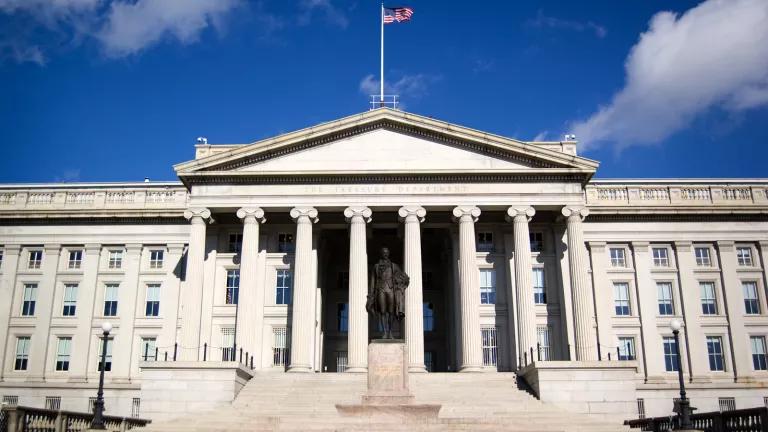Pebble Mine 2023: Tribes Win Veto, State Hail Marys SCOTUS
After EPA issues rare veto of massive Bristol Bay mine, Dunleavy Administration throws lifeline to Canadian owner, lodging dubious claims in U.S. Supreme Court.

President Biden celebrating EPA veto with young guests from Bristol Bay
Joel Reynolds
In the decades-long battle against the destructive Pebble Mine, 2023 will always be remembered as the year the U.S. Environmental Protection Agency (“EPA”) issued a Final Determination of veto—at last.
On January 30, 2023, twelve years after six Bristol Bay Tribes filed a petition under Clean Water Act section 404(c), the EPA completed its review and vetoed the Pebble Mine – an administrative action taken by the agency just three times in the past 30 years. Relying on an exceptionally extensive scientific record, the agency concluded that the project would pose “unacceptable adverse effects” on Bristol Bay’s fisheries, as well as on the region’s aquatic and recreational resources. At long last, the salmon—and the Tribal communities they’ve sustained for centuries—have prevailed.
But like a hideous zombie from a Hollywood horror movie, the universally condemned Pebble Mine has refused to die. Intensely opposed by the region’s residents, abandoned by its mining partners, denied a federal permit by the Trump Administration, unanimously rejected by Alaska’s congressional delegation, and beleaguered for over a decade by the consistent financial failures of a Canadian owner whose stock value has plummeted since 2011 to just pennies a share. Despite all of this—and despite EPA’s veto in 2023—the Pebble Mine continues to threaten the Bristol Bay region, its fisheries, and its people.
Northern Dynasty Minerals – the project’s 100 percent owner—fights on. In July, rather than appealing EPA’s action to federal district court, the company has supported the Dunleavy Administration’s application in July directly to the United States Supreme Court to overturn the veto based on the state’s claim of a constitutional right to “original jurisdiction.” According even to Pebble Mine CEO John Shively, the application is “unusual,” seeking to “skip the lower courts” by persuading the Justices to credit the state’s rhetorical attack on the veto as a strike “at the heart of Alaska’s sovereignty,” “taking state property without just compensation.”
Claiming that Alaska is the “exception,” the Dunleavy Administration asks the Court to ignore its own precedent by (1) exempting the state from regulation under the Clean Water Act and (2) reversing EPA’s twelve-year administrative review without benefit of the congressionally mandated process for appeal of federal agency decisions. As 2023 ends, the Court’s decision on whether to accept the case is pending.
Briefly summarized, in chronological order, here is a listing of a dozen significant highlights from 2023:
On January 11, building on waves of paid media throughout 2022, the Bristol Bay Defense Fund (supported by NRDC as one of its founders) produced a full-page ad in Politico urging EPA to “End the Threat” of the Pebble Mine. Concurrently, a coalition of 122 organizations, representing over ten million members and activists nationally, delivered a letter to the EPA’s Assistant Administrator for Water supporting the agency’s recommended veto and urging that it issue a Final Determination.
On January 30, for only the third time in three decades and the 14th time in the history of the Clean Water Act, the EPA issued a veto under section 404(c), prohibiting development of the Pebble Mine and restricting future large-scale mining in specified lands surrounding the Pebble deposit based on quantitative impact criteria. According to EPA Administrator Michael Regan, the agency’s decision “underscores the true irreplaceable and invaluable natural wonder that is Bristol Bay.” Northern Dynasty and the State of Alaska, led by Pebble Mine acolyte Mike Dunleavy, promptly promised to sue.
On February 1 and in the weeks following, the Bristol Bay Defense Fund and NRDC placed full page ads in the New York Times, Washington Post, The Hill, Seattle Times, and Anchorage Daily News thanking EPA for stopping the Pebble Mine. To ensure the message reached agency staff, thanks were also projected on the façade of EPA headquarters in Washington, D.C.
On April 25, the U.S. Army Corps of Engineers Pacific Ocean Division issued a partial remand of the agency’s November 2020 permit denial in order to “re-evaluate specific issues in the administrative record to ensure that the decision is well supported.” That remand is still pending, with a deadline most recently extended, according to a November 27 Northern Dynasty press release, “until the Supreme Court acts on the State of Alaska’s bill of complaint challenging the Environmental Protection Agency’s exercise of its Clean Water Act, Section 404(c) authority.”
On May 11, to recognize the significance of EPA’s veto and the “marvel” that is Bristol Bay, President Joe Biden hosted a celebration in the White House Rose Garden attended by 200 guests, including scores from Bristol Bay and numerous coalition partners and allies. According to the President, “Bristol Bay is an extraordinary place unlike anywhere in the world .... The amazing thing about resources like this: If you take care of it, it can go on forever.” Because scientists concluded that “there is no way to do this project safely,” and EPA issued a veto, “the mine will not be built.” To everyone who had a role in saving Bristol Bay, his message was unequivocal: “Thank you, thank you, thank you, thank you.”
On July 26, the Dunleavy Administration lodged a motion for leave to file a bill of complaint against EPA in the Supreme Court. On September 25 and 26, amicus briefs were filed in support of the complaint by Northern Dynasty and its Pebble Partnership, the National Mining Association, and the Alaska Industrial Development and Export Authority.
On August 1, the Bristol Bay Defense Fund released results of a Moore Information Group public opinion survey finding that (1) “fully 74% of [Alaska] voters say they are concerned with protecting all of Bristol Bay from large-scale mining for the long term,” even after EPA’s veto; and (2) “another 63% of voters said they are supportive of legislation that would protect Bristol Bay from large-scale mining ‘forever.’”
On September 4, representing the Tribal communities of the region, United Tribes of Bristol Bay Executive Director Alannah Hurley published an op ed in the Anchorage Daily News attacking the state’s Supreme Court complaint. According to Hurley, “if Governor Dunleavey would listen to Alaskans on this issue, he would not be spending state dollars in an attempt to reverse protections for Bristol Bay.” She called for “legislation that permanently protects the entire Bristol Bay watershed from the Pebble mine and the more than 20 active mining claims in the watershed that still threaten the region.”
On September 22, Alaska Department of Fish and Game released an overview of the 2023 Bristol Bay commercial salmon season, with an inshore sockeye salmon run of 54.5 million fish—the eight largest inshore run since 2003, 17 percent above the 46.7 million average run for the last 20-year period (2003-2022).
On November 5, United Tribes of Bristol Bay celebrated its tenth anniversary of leadership and service to the Tribal communities of the region, including securing the 2023 EPA veto.
On November 9, the Solicitor General of the United States, on behalf of defendants United States and EPA, filed an opposition to the State of Alaska’s bill of complaint in the Supreme Court. Amicus briefs in support of defendants were filed by United Tribes of Bristol Bay and Bristol Bay Native Corporation and by Trout Unlimited. Dismissing the central theory of the Dunleavy Administration’s case as “insubstantial,” the Solicitor General explains that “Alaska alleges no plausible basis to conclude that the State or its lessee has the right to mine lands conveyed via the Statehood Act without complying with generally applicable federal law.” Succinctly stated by the Tribes, “the only thing ‘original’ about this case is the breathtaking expansion of this Court’s original jurisdiction Alaska seeks.”
On November 20, the state filed a reply brief in support of its complaint. Briefing having been completed, a decision by the Court on whether it will accept the complaint and agree to hear the state’s case is expected in January. The Court should decline the invitation.
As 2023 comes to an end, we are deeply grateful for EPA’s leadership and determined to defend its veto decision for as long as may be required— in the Supreme Court or, if that Court declines the state’s unprecedented invitation to intervene, in the normal appellate process established by Congress for review of complex, fact-based agency actions.
But the continuing threat posed by this reckless zombie project opposed for decades by Alaskans demonstrates the need, ultimately, for federal legislation to permanently protect Bristol Bay from the Canadian mining company that has mercilessly stalked the region’s communities for a generation. Congressional action is essential because, without it, the only certainty in the future of Bristol Bay will continue to be the inevitable pressure for large-scale mining in its headwaters despite all efforts to preserve this national treasure—and the unparalleled generosity of its fisheries—forever.

Iliamna Lake, Bristol Bay
Joel Reynolds



